
Naming every expedition participant in a telepresence-enabled mission is next to impossible! Many from dozens of institutions across the country have provided input into the expedition plan and are expected to participate. However, we've assembled information about the members of the science and remotely operated vehicle teams who are physically onboard NOAA Ship Okeanos Explorer, and whose voices you are likely to hear most often when watching the live video. And of course, none of this exploration would be possible without the work of the dedicated NOAA Commissioned Officer Corps and civilians who operate NOAA Ship Okeanos Explorer as part of NOAA's fleet managed by NOAA's Office of Marine and Aviation.
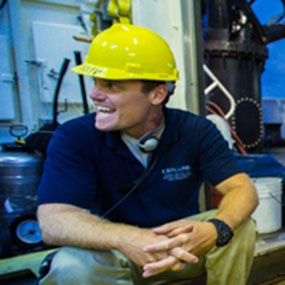
Faculty, University of Hawaii, College of Engineering
Brian Bingham received his Ph.D. in mechanical engineering from the Massachusetts Institute of Technology in 2003. After a brief stint at the Ocean Institute in California, Brian was appointed to a post-doc position at the Woods Hole Oceanographic Institution, Deep Submergence Lab. He is currently a faculty member at the University of Hawaii at Manoa where he does research on innovative tools for expanding the capabilities of ocean science for exploring, understanding, and protecting the marine environment. Brian is a highly published author and his work includes projects on underwater navigation, autonomous vehicles, and sensor integration. Brian's broad experience in the deep ocean community makes his contributions to the Ocean Exploration Program invaluable. His skill as a navigator, co-pilot, and a very experienced vehicle control engineer are but a few of the talents Brian brings to the group. He is the recipient of the 2010 Hi Chang Chai Excellence in Teaching Award at the University of Hawaii, College of Engineering which has made him a great fit for our program's dedication and commitment to mentoring young engineers. When not on assignment for Ocean Exploration, Brian resides in Honolulu, Hawaii.
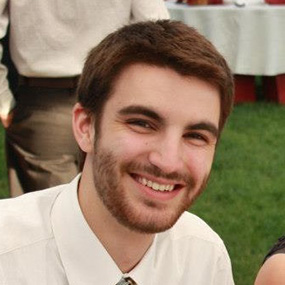
Data Management Intern
Dan Bolan is a graduate the University of New Hampshire (UNH), where he received his B.S. in Computer Science in 2014. He is currently pursuing an M.S. As a Research Assistant, he has been working on data visualization at UNH's Center for Coastal and Ocean Mapping and dabbling in motion planning for robotics. Dan has also worked for New Hampshire Public Television, where he handled the creation and management of metadata for various web media and UNH's InterOperability Lab as a software developer and test technician. He completed a Systems Quality Internship with Calix, Inc. in Petaluma, California. Dan joins the Okeanos Team as a Data Management Intern, helping to ensure all collected data is clean and ready for onshore consumption as soon and as easily as possible.
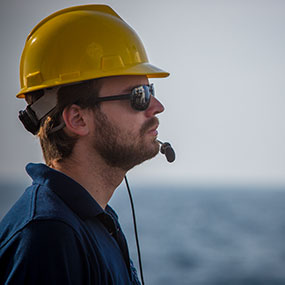
Mechanical Engineer
Joshua Carlson attended the University of Massachusetts, Dartmouth, where he received a B.S. in Mechanical Engineering with minor in Business Administration. He went on to receive his M.S. in Marine Observation Technology from the University of Massachusetts, Dartmouth School for Marine Science and Technology. Josh has a diverse background, encompassing the use of autonomous underwater vehicles (AUVs) and other types of ocean observation platforms for the purpose of studying ocean turbulence. He has designed and built a deep-ocean camera platform for filming deep-water krill in the Antarctic Ocean and provided mechanical engineering and software capabilities on the Woods Hole Oceanographic AUV Sentry during a recent cruise aboard the NOAA ship Okeanos Explorer. In his current position with NOAA’s Ocean Exploration program, Josh provides engineering, programming, and at-sea support, acting in the capacity of navigator, pilot, and co-pilot for NOAA’s 6000-meter-rated remotely operated vehicle system, Deep Discoverer. His broad range of skills in both engineering and software control development makes him an invaluable member of our team. When not traveling, Josh resides in Fairhaven, Massachusetts.
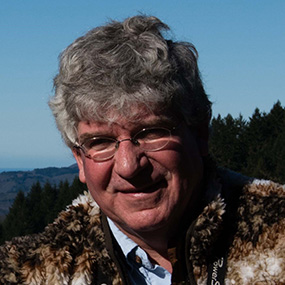
Associate Professor of Geology, University of Wyoming
Mike Cheadle is a geologist/geophysicist who studies the creation of oceanic crust at mid-ocean ridges. He became interested in marine exploration midway through his career, after realizing that ocean basins are one of the last great frontiers of exploration on the Earth, which he illustrates by explaining that we know more about the topography of the dark side of the Moon than we do about the bathymetry of the ocean basins. Mike earned his B.A. in Geology from Oxford University in 1981, an M.S. from Cornell University in 1984, and graduated with a Ph.D. in geophysics from the University of Cambridge in 1989. He held a post-doctoral fellowship from the Royal Commission for the Great Exhibition of 1851 from 1989-1991, before accepting a faculty position at Liverpool University. In 2001, he moved to the USA to become a professor at the University of Wyoming, where he has won five teaching awards, including being voted a “top 10 teacher” twice in the college of Arts and Sciences. One of Mike’s career highlights was visiting the South Pole and spend five weeks camping in Antarctica to study the Dufek Layered Intrusion. He has sailed on many U.S. and Japanese-led research cruises and studied mid-ocean ridges in the Atlantic, Indian, and Pacific Oceans. He visited the seafloor in the Indian Ocean in the JAMSTEC Shinkai 6500 manned submersible. Mike and his students have previously participated in Okeanos Explorer and Nautilus telepresence-enabled missions as scientists on shore.
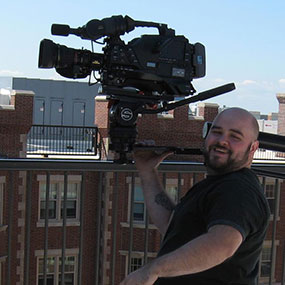
Telepresence Engineer, NOAA Office of Ocean Exploration and Research
Jared Drewniak is a New England native with a passion for science, technology, and story telling. Over the course of his career he has been an improv comedian, a crime reporter in New York City, a Distance Education Technical Director at Harvard, a Field Operations coordinator at the Massachusetts Institute of Technology (MIT), and freelance education consultant. His early work with Northeastern University and MIT helped pioneer technology and techniques for distance learning that have become standard practice today. He was an early entrant into the nascent field of Massive Online Open Course education and produced some of the first courses featured on EdX. His live broadcast work with both the International Space Station (for NASA TV and MIT) and the Okeanos Explorer deep-sea exploration program (for NOAA) means he has connected some of the highest and deepest live broadcast origins in the history of mankind. He remains unsure if this qualifies as a Guinness World record or not.
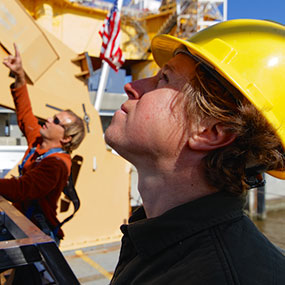
Mechanical Engineer
Todd Gregory received his B.S. in Naval Architecture and Marine Engineering from Webb Institute in 1999 and his M.S. of Ocean Engineering from the University of Hawaii at Manoa in 2001. From 2002 to 2010, Todd was employed by Dr. Robert Ballard’s Institute for Exploration, where he served as the principle mechanical/ hydraulic designer for the remotely operated vehicle (ROV) system Hercules. He has served as a Guest Investigator at the Woods Hole Oceanographic Institution and as an Associate Marine Development Engineer at the University of Rhode Island-Graduate School of Oceanography and is currently a Mechanical Engineering Consultant to NOAA’s Office of Ocean Exploration and Research (OER). Todd is our principle mechanical engineer for OER’s 6000-meter rated, two-body ROV system Deep Discovererand Seirios, and is one of the chief pilots during our offshore operations. He has participated in numerous international research expeditions and is a tremendous asset to the oceanographic community. His efforts in mentoring our newer engineers and impeccable attention to detail are but a few of his many contributions to the Ocean Exploration program. Todd currently resides in North Kingstown, Rhode Island.
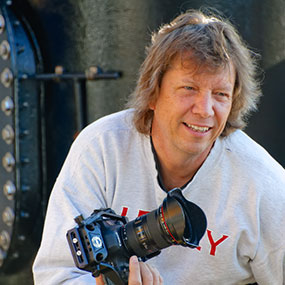
Photographer and Producer
For 34 years, Emmy-award winning photographer and producer Art Howard has helped viewers experience life through images from 50 countries and seven continents. A native North Carolinian, Art has followed researchers aboard multiple deep-sea missions, documenting the excitement and challenges of offshore reef exploration. Art will use the latest video technology to bring viewers as close as possible to life at sea from the surface to depths of 3,000 feet, capturing both the scientists and the life they seek to understand. Howard has spent the last 11 years independently producing media for the North Carolina Museum of Natural Sciences.
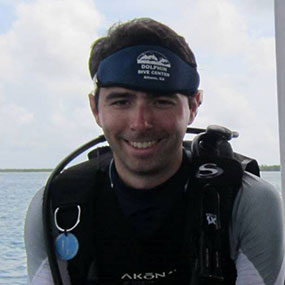
Expedition Coordinator, NOAA Office of Ocean Exploration and Research
When Brian was five years old, he decided that he wanted to be a marine biologist and explore the unknown reaches of the planet, and now he has his dream job. Originally from land-locked Athens, Georgia, Brian grew up fascinated with marine mammals and the ocean. Brian attended the Honors College at the College of Charleston (CofC) in South Carolina where he majored in Marine Biology and minored in Marine Geology. While at CofC, he had the opportunity to sail on multiple research cruises aboard two different NOAA research vessels and meet multiple NOAA Commissioned Officer Corps members. Shortly after graduating with honors from CofC, Brian was awarded a commission in the NOAA Corps. His first sea assignment was as a Junior Officer aboard NOAA’s Okeanos Explorer, America’s Ship for Ocean Exploration. Upon completion, Brian was then assigned to NOAA’s Ocean Exploration Program, where he is now an Expedition Coordinator for the Okeanos Explorer. Since joining the NOAA Corps, Brian has participated in or led more than 25 expeditions of exploration taking him to two oceans (Atlantic and Pacific), three continents (North America, South America and Asia), and through the waters of more than five countries (Ecuador, Panama, Costa Rica, Honduras, Indonesia). As Expedition Coordinator, Brian is responsible for overseeing all aspects of an expedition, including arranging logistics, planning science operations, obtaining international clearances, and coordinating public outreach.
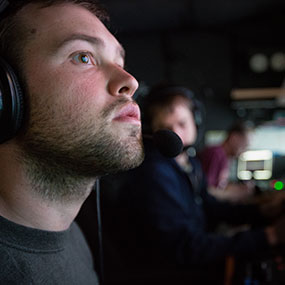
Electrical Engineer
Jeff Laning holds a B.S. in Electrical Engineering from the University of Vermont. His career started as an intern with Greensea Systems, Inc. where he worked on design, development, and integration of components and software associated with remotely operated vehicles and autonomous underwater vehicle systems. Jeff is one of youngest members and comes to our group with a great attitude for learning new and relatively complex electrical systems. Electrical engineers interested and capable of working on deep submergence systems are one of the hardest positions to fill. Jeff has done a great job for us and continues to build his experience under the guidance of some of our older and more experienced mentors. He was a key member of the team that built Deep Discoverer and has become a skilled navigator and is currently training as one of our pilots. His contribution to ocean exploration is certainly something to be proud of and we hope that other young engineers will be inspired by what he has accomplished. Jeff currently resides in Rhode Island.
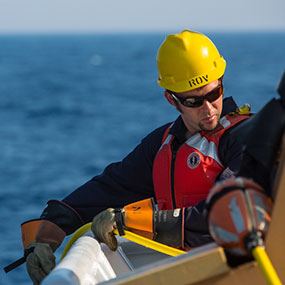
Mechanical/Ocean Engineer
Karl McLetchie is a graduate of the Massachusetts Institute of Technology. He holds B.S. and M.S. degrees in Ocean and Mechanical Engineering. After graduating, he worked as an ocean engineer on the development of autonomous underwater vehicles and as a naval architect on the design of high-speed aluminum vessels. In 2008, he started his own contracting company, SeaKnowledge, to support the use of underwater vehicles for research and exploration. He has worked as a remotely operated vehicle pilot and navigator on the Okeanos Explorer and the E/V Nautilus ever since. When not on assignment for Ocean Exploration, Karl resides in Pemaquid, Maine.
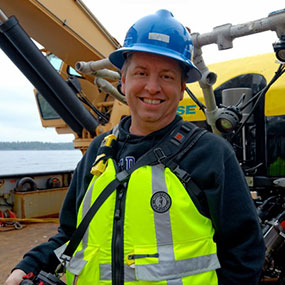
Video Producer, Editor, Post-Production Supervisor
Ed McNichol is a communications technology professional with 30+ years of global video expertise. He is an avid scuba diver and Divemaster based in Seattle, Washington. He combines both of these interests through his work supporting deep-sea research and exploration using remotely operated vehicles (ROVs). He has served as an onboard Expedition Video Systems Specialist and Mission Photographer on more than a dozen international missions, working with seven different vehicles. His specialties include designing, building, and operating sophisticated shipboard video systems in a mobile form factor. These systems perform a multitude of mission critical functions, including recording and archiving of high-definition video with embedded metadata, producing live satellite streaming with interactive webcasts, and video production services. He also has experience in best practices for digital asset management and protection, as well as event logging. He enjoys capturing dynamic still photos that feature shipboard mission operations while including rich metadata.
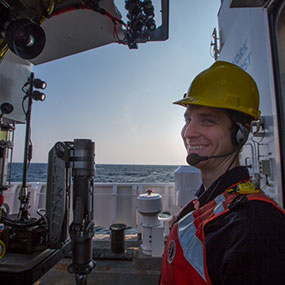
Systems/Robotics Engineer, Autonomous and Remotely Operated Underwater Vehicles
Bobby Mohr is a Systems/Robotics Engineer, specializing in autonomous and remotely operated underwater vehicles. He holds a B.S. in physics and graduated cum laude from Davidson College in 2009. Bobby started his career as an engineering technician with Greensea Systems where he was responsible for the design, development, and testing of autonomous underwater vehicle control systems. Like many of our engineers, Bobby realized that he would enjoy the design-build process more if he was able to also pursue the challenges of making vehicles work successfully at sea. After serving on several projects at Greensea where he specialized in electrical and software systems support, Bobby joined the Ocean Exploration program as an electrical systems engineer. During his time at Greensea and now with NOAA, he has been one of the key electrical engineers on the development of our 6000-meter-rated remotely operated vehicle system, Deep Discoverer and Seirios. Like many of our engineers, he has multiple skills and is a tremendous asset to our program.
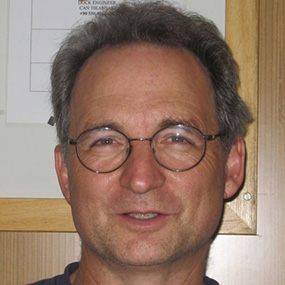
Mechanical Engineer/Pilot
Jim Newman’s career has centered on the development and deployment of remotely operated underwater vehicles (ROVs) for various scientific uses. Among other projects, Jim led the development and deployment of underwater vehicle systems under contract to the Institute For Exploration (now the Ocean Exploration Trust; OET), including the ROVs Hercules and Little Hercules. Jim also managed the acquisition and conversion of OET’s 64-meter exploration vessel, the E/V Nautilus. More recently, Jim has been working on development of ROVs and other underwater systems for the NOAA Office of Ocean Exploration and Research, Woods Hole Oceanographic Institution, Neptune Canada, and Hydroid. Jim is an adjunct Professor of Ocean Engineering at the University of Rhode Island, where he developed and taught a graduate-level course on ROV design. Jim was the Project Leader for the development of the Tiburon ROV system at Monterey Bay Aquarium Research Institute, and worked as a member of the engineering team that developed the JASON and JASON Junior ROVs at the Woods Hole Oceanographic Institution. Jim operates Woods Hole Marine Systems, Inc., and holds Bachelor’s and Masters’ degrees in Ocean Engineering from the Massachusetts Institute for Technology.
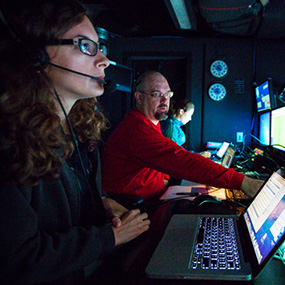
Postdoctoral Researcher, U.S. Geological Survey Southeast Ecological Science Center
Andrea Quattrini holds a Ph.D. from Temple University in Philadelphia, Pennsylvania. Prior to beginning the Ph.D. program, Andrea received a B.S. from Millersville University and an M.S. from the University of North Carolina at Wilmington. Since 2002, Andrea has participated in more than 20 research cruises using deep-submergence vehicles. She also has extensive experience with telepresence-enabled cruises. Broadly, Andrea is interested in how biodiversity is generated and maintained in the deep sea. Specifically, she focuses on the relative roles of habitat heterogeneity and dispersal in shaping deep-sea coral and fish communities. Andrea is serving as the biological science lead during this 2015 expedition. She will help to coordinate the science objectives of both the shore-based and ship-based science teams during the exciting exploration of poorly known deep-sea habitats around Puerto Rico and the U.S. Virgin Islands.
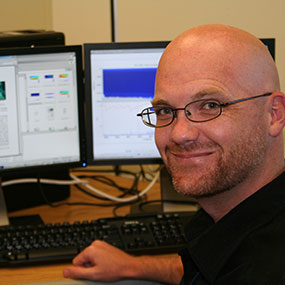
Oceanographer/Data Manager, NOAA Office of Ocean Exploration and Research
Brendan Reser is an oceanographer responsible for integrating telepresence with data management aboard the NOAA Ship Okeanos Explorer. He ensures that exploration data collections are accessible to shoreside participants during and after the expedition. Brendan specializes in automating processes and in developing unique data display capabilities. Prior to joining NOAA, Brendan was involved in field sampling and data management efforts in response to the Deepwater Horizon incident. Brendan has a Master of Science degree in Oceanography from Oregon State University and a Bachelor of Science degree in Biology from the University of New Mexico. He is currently employed by General Dynamics Information Technology, and is contracted to support NOAA's Office of Ocean Exploration and Research through NOAA’s National Coastal Data Development Center (NCDDC). His operational base is the NOAA field office located at NCDDC, Stennis Space Center, Mississippi.
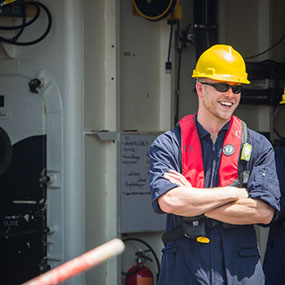
Ocean Engineer
Chris first joined our group on the Cayman Rise Expedition in 2011, just prior to being hired full time by NAVSEA. Since then, an informal NAVSEA-NOAA relationship has allowed Chris to continue to participate in our design, engineering, and offshore operations. Chris holds a B.S. in Ocean Engineering and a B.S. in Aerospace Engineering from Virginia Tech with a minor in mathematics. He is currently working on his M.S. in Ocean Engineering at Virginia Tech and expects to complete that program in 2015. Chris has been a major contributor to our design-build process and a tremendous asset to our offshore operations. He is a skilled navigator, pilot, and co-pilot of our vehicles and brings with him a level of enthusiasm that everyone around him appreciates and respects. The Office of Ocean Exploration and Research is very lucky to have his participation and we applaud NAVSEA for their insight, training, and willingness to share great talent. Chris resides in Arlington, Virginia.
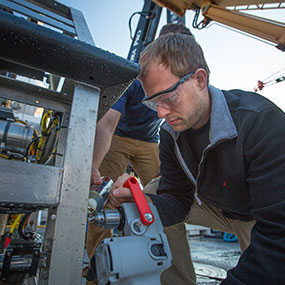
ROV Engineer and Telepresence Team Member
Daniel Rogers brings with him a diverse background in engineering, media production, and education. Daniel holds a B.S. in physics and received an M.S. in mechanical engineering from the University of Hawaii in 2013. His graduate work focused on the development and evaluation of an autonomous marine vessel designed for port and harbor security missions. Before starting his graduate program, Daniel worked as a science educator at the Bishop Museum in Honolulu where he continued as a digital media producer while in school. A lifelong interest in the sciences inspires him to learn all he can about the natural world and he is passionate about sharing the drama, allure, and wonder of scientific inquiry with others. Daniel currently works as a media producer and autonomous systems engineer in Honolulu, Hawaii.
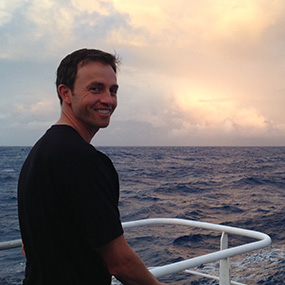
Physical Scientist/Hydrographer, NOAA Office of Ocean Exploration and Research
Derek Sowers holds a B.S. in Environmental Science from the University of New Hampshire and an M.S. in Marine Resource Management from Oregon State University. He has 14 years of previous coastal research and management experience, including work for NOAA’s National Estuarine Research Reserve network and the Environmental Protection Agency’s National Estuary Program in both Oregon and New Hampshire. Derek has participated in ocean research expeditions in the Arctic Ocean, Gulf of Maine, Gulf of Mexico, Pacific Northwest continental shelf, North Atlantic Canyons, and New England Seamounts.
During at-sea expeditions, Derek leads sonar data collection by planning the ship’s mapping routes and producing maps of seafloor and water column features to guide exploration. On shore, Derek works at the Center for Coastal and Ocean Mapping/Joint Hydrographic Center at the University of New Hampshire to coordinate future mapping expeditions, process and archive data, and collaborate with other scientists. Derek is also a part-time Oceanography Ph.D. student focused on using Extended Continental Shelf and Okeanos Explorer data to develop marine ecological classification maps.
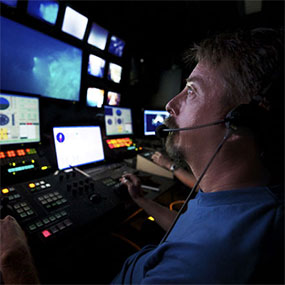
Electrical Engineer
Dave Wright joined the Ocean Exploration Program in 2009, bringing a set of skills that most would envy. A self-taught engineer, he is highly respected in the field of underwater technology, having spent a great deal of time working with Dr. Robert Ballard at the Institute for Exploration and as a valued member of the Monterey Bay Aquarium Research Institute. Dave is one of our senior pilots and in addition to being an outstanding and invaluable electrical engineer, he is one of our most valued and respected mentors to the younger generation we seek to train. Dave is a veteran of some of the earlier Ocean Exploration projects, having served as pilot on the 2004 Titanic cruise, the 2004 and 2005 Mountains in the Sea cruises, and the 2005 cruise to Lost City. He is a co-inventor of the 'Aquatic Autosampler,' a fully automated system for in situ species identification of toxic phytoplankton, which was developed while he worked at the Monterey Bay Aquarium Institute. When not on assignment with Ocean Exploration, Dave resides in Louisville, Kentucky.
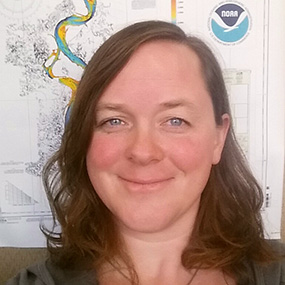
Physical Scientist, NOAA Office of Coast Survey
Erin Weller is a Physical Scientist with the Office of Coast Survey, Atlantic Hydrographic Branch in Norfolk, Virginia. She will be working aboard the NOAA Ship Okeanos Explorer to provide expertise in mapping efforts for the current cruise.
Erin has worked as a hydrographer for 10+ years with experience on several NOAA ships, at the Pacific and Atlantic Hydrographic branches, as well as in the private sector. She received a Master’s in Geography and GIS at East Carolina University (2006). On the weekends, she enjoys spending time on the beach throwing frisbee with her dog, Buoy.